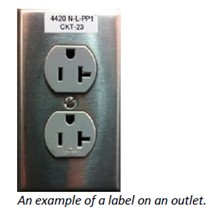The Section for Long-Term Care Regulation will be releasing a series of Life Safety Code Information. You may also view the entire document for reference.
Today’s subject is:
Acceptable Plans of Correction
A plan of correction (POC) must be submitted within 10 calendar days from the date the facility receives its Form CMS-2567. According to the State Operations Manual (SOM) §7317, an acceptable POC must:
Address how corrective action will be accomplished for those residents found to have been affected by the deficient practice;
Ensure every example, especially for those tags that encompass multiple deficient practices, has been addressed. K918 for example, covers generator installation, testing, maintenance, records, fuel, connections, and electrical mains and circuit breakers. If the SOD contains an example of the facility not completing the monthly 30 minute load bank test, an example of the diesel fuel not tested annually, and an example of the main and circuit breakers not inspected/tested annually, then each example needs to be identified on the POC and needs to state in detail what will be done to ensure each example is corrected.
Address how the facility will identify other residents having the potential to be affected by the same deficient practice;
How will all residents at risk for the deficient practice be identified? How will the deficient practice be corrected for all residents, not just the cited examples? For example, if five sprinkler heads are identified as having paint on them and cited as examples under K353, all sprinkler heads in the facility that have paint on them will need to be replaced, not just the five cited examples.
Address what measures will be put into place or systemic changes made to ensure that the deficient practice will not recur;
Has the deficient practice that caused the deficiency been identified? What changes will occur to prevent the deficient practice from reoccurring? For example, if K363 was cited on the SOD for examples of corridor doors not latching and having penetrations and gaps, all corridor doors shall be maintained to resist the passage of smoke. Who is responsible for inspecting the corridor doors and how often? Is there a system for direct care staff to report maintenance issues to the maintenance department? What in-services need to occur and who needs to be involved in the training.
Indicate how the facility plans to monitor its performance to make sure that solutions are sustained and;
How will the monitoring be accomplished? Who is responsible for monitoring and what are their qualifications? What is the frequency of monitoring? For example, K923 was cited for not securing oxygen cylinders within the oxygen storage room. Although this is considered a LSC issue due to the risk of fire, nursing staff are the primary handlers of the oxygen cylinders and typically access the oxygen storage room more than maintenance staff. In this case, the maintenance staff may have not been monitoring the oxygen storage room and relying on nursing to ensure the oxygen cylinders are secured. The POC should then identify who will monitor the oxygen storage room moving forward (Maintenance, Charge Nurse, DON, etc…?). What form will the individual use to document their monitoring and how often will monitoring occur (Daily, Weekly, etc…?). Do policies need to be revised related to who will monitor, how often, what forms will be used, and who will oversee to ensure the monitoring is being completed? Does the POC state whether the deficient practice is being addressed with the QA Committee on a regular basis?
Include dates when corrective action will be completed.
Is there a date for completion of the corrective action? Is the timeframe reasonable given the work that is being done? Remember, the deficient practice is not completely corrected until all work is finished. A deficiency cannot be corrected if an item has been ordered but not yet installed. An invoice or confirmation of a future installation or inspection will not put the facility back into compliance. Is a time limited waiver needed to accomplish this? If so, the facility should reach out to the department to discuss a waiver. For example, a facility was cited for not having access to their smoke barriers and their POC states they are adding an access door through the ceiling, the completion date on the POC should reflect when the access door will be physically installed and not just scheduled. Each specific deficiency should include a corrective action date and the facility should adhere to those dates as stated on the POC. Staff education should also be considered when determining the corrective action completion dates.

